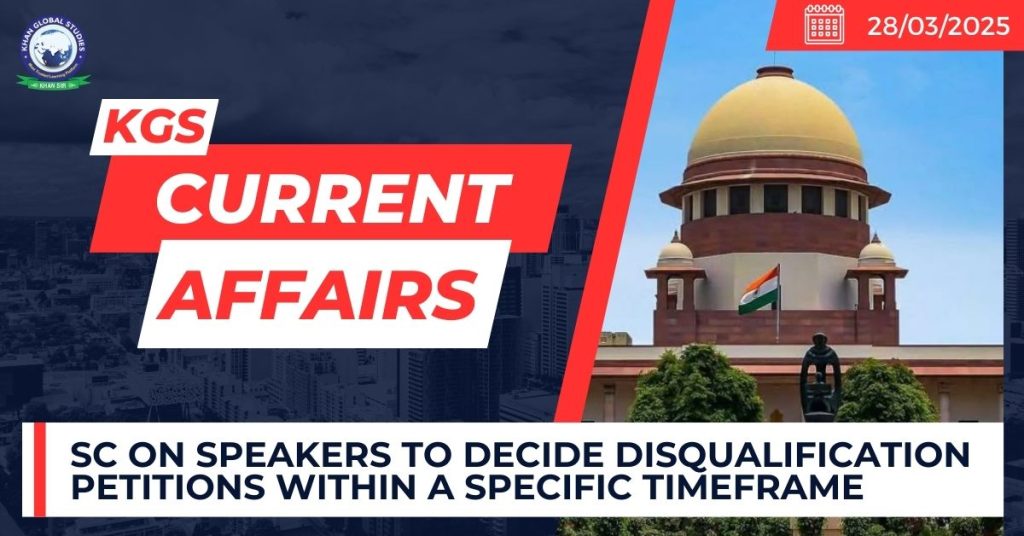Context:
A Supreme Court Bench, headed by Justice B.R. Gavai, is hearing petitions regarding the disqualification proceedings in Telangana under the Tenth Schedule of the Indian Constitution.
More on the News
- The petitions seek timely action by the Telangana Assembly Speaker on pending disqualification proceedings against 10 MLAs involving defection.
- The Supreme Court is now contemplating whether it can direct the Speaker to act within a defined time.
- The question under consideration is whether a constitutional court can mandate the Speaker to discharge their constitutional duty on time.
Background
- After the 2023 Telangana Assembly election, 10 MLAs from the Bharat Rashtra Samithi (BRS) defected to the Congress Party.
- The Congress Party achieved a significant win, securing 64 out of 119 seats in the election.
- This victory led to the ousting of K Chandrasekhar Rao’s BRS, which had been in power in the state since its formation in 2014.
Arguments by the Petitioners
- The Supreme Court has previously intervened to urge Speakers to decide long-pending disqualification petitions. This establishes a precedent for judicial oversight.
- As a quasi-judicial authority, the Speaker’s decisions should be subject to judicial review to ensure fairness.
- While courts cannot dictate the Speaker’s decisions, they can ensure the Speaker exercises their constitutional authority in a timely manner.
- Petitioners contend that political considerations influence Speakers’ decisions, resulting in prolonged delays.
- Petitioners propose a four-week deadline for the Speaker to resolve disqualification petitions, ensuring timely and impartial decisions.
- Political parties may delay disqualification proceedings until the Assembly’s term ends to render them ineffective, which could be prevented with a fixed timeline.
Potential Implications of the Verdict
- A Supreme Court ruling mandating a timeline could reduce the misuse of delays, which is often used for political manoeuvring.
- A set timeline could increase transparency and accountability in the disqualification process.
- Without a strict deadline, there is a risk that the status quo of delay and political manipulation may persist.
Previous Cases and Recommendations
Supreme Court in Keisham Meghachandra Singh vs. Speaker of the Manipur Legislative Assembly (2020):
- The Court suggested that Parliament should consider amending the Constitution to define the Speaker’s role more clearly in disqualification cases, making them a quasi-judicial authority.
- A suggestion was made to create an independent tribunal for handling disqualification cases, headed by a retired Supreme Court judge or a retired Chief Justice of a High Court.
Kihoto Hollohan Case, 1992: The Supreme Court held that the decision of the presiding officer is not final and can be subject to judicial review in the courts.
2nd Administrative Reforms Commission:
- It suggested that the disqualification of members on the grounds of defection be decided by the President or Governor based on the Election Commission’s advice, ensuring an impartial process.
About the 10th Schedule
- Defections of legislators in the 1960s and 70s caused political instability in many States, leading to the fall of elected governments.
- To address this issue, the 52nd Constitutional Amendment introduced the ‘anti-defection’ law through the Tenth Schedule in 1985.
- Article 102(2) of the Indian Constitution states that a person is disqualified from being a member of either House of Parliament if they are disqualified under the Tenth Schedule (also known as the Anti-Defection Law).
Key Provisions of the Tenth Schedule:
- A member of Parliament or State legislature who voluntarily gives up party membership or votes against the party’s instructions is liable for disqualification.
- If one-third of the members of the legislature party split to form a new group, they would not face disqualification.
- If a political party merges with another party and at least two-thirds of the members of the legislature party agree to it, no disqualification would occur.
- To strengthen the anti-defection law, Para 3 (which allowed for the splitting of one-third of a legislature party without disqualification) was omitted in 2003.

